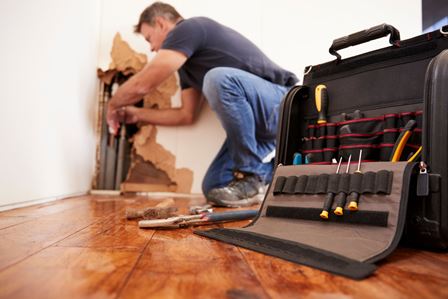Nearly every homeowner will experience plumbing problems every so often. How frequent this depends significantly on factors like how well your pipes are maintained and how proactive you are as a homeowner with plumbing-related issues. There are experts you can call when a problem does come; however, remember that in between those visits from experts, a bulk of the effort still is the homeowner’s responsibility.

While not the most glamorous part of your home, the home’s plumbing is an intricate system that brings fresh, clean, and heated water. Easy access to water can seem so common that you might take it for granted. But, when a plumbing issue does come, there’s no denying what an inconvenience it can be.
Here’s a good read that homeowners can use to equip themselves with some of the most critical plumbing tips and advice.
Don’t Pour Oil And Grease Down The Drain
After cooking and washing dishes, pouring all the leftover oil and grease down the drain can be tempting. This might seem relatively harmless at first glance, especially considering that it’s in liquid form and appears to flow smoothly through.
While it may be, the truth is that pouring oil and grease down the drain is a lot more harmful to your pipes and plumbing system. Over time, it can cause stickiness and oiliness on your drain and pipes, which in turn leads to clogs.
To avoid this, make it a point never to pour oil and grease down your drain. Before washing the pan, pour used oil into a separate old container first, like jars from other kitchen condiments. Then, throw it in your regular garbage disposal.
Learn Where The Main Water Shutoff Valve Is Located
It is imperative for homeowners to know the location of the main water shutoff valve as part of basic home maintenance. This valve is a key element in controlling the water supply to your property.
The location of the main water shutoff valve may vary, but common areas where it is usually found include the basement, garage, or close to the water heater. Consulting your home’s plumbing plan is also an effective way to determine its location.
Being aware of where the shutoff valve is located is essential in emergency situations, such as water leaks or burst pipes. Quickly shutting off this valve can significantly reduce the risk of water damage to your property.
Test The Water Pressure Once In A While
If you have a sudden drop in water pressure, you will notice this immediately. This can be due to corroded or clogged pipes and buildup in the faucet heads. Likewise, most homes today have a pressure-regulating valve that fails over time because of debris.
If you can’t find the cause of the low water pressure, let a plumber check it. They’ll not only unblock the drain but also give you sound advice on how to avoid it the next time.
Keep A Plunger In Every Bathroom
Nothing is more annoying than blocked drains in sinks, tubs, or the toilet. The most common culprits are soap, hair, and other debris. Thankfully, there’s a quick and easy first aid, easy enough to fix with a plunger.
Next time you go to the supermarket, put this on your list. Plungers are often overlooked by homeowners to keep in their bathrooms, but it’s convenient to have one. Before calling a plumber, try using a plunger first, as in most cases, that’s sufficient.
Not Everything Is Meant To Be Flushed
Your toilet flushes into the septic tank, which is not designed to handle the same materials as a waste basket. Remember, not everything is meant to be flushed. In fact, only toilet paper and human waste should go there; nothing else. Not even the softest cotton, wet wipes, or worse, diapers and sanitary napkins.
If you’re tempted to risk your toilet bowl’s health, be ready for a severe clog. As a warning, fixing this requires quite an extensive job, and an expensive one at that, too.
Take Part In Preventive Cleaning
Yes, there’s such a thing as preventive maintenance for your plumbing system. Instead of dealing with a clogged drain, it’s better to include the upkeep of your drains in your household’s regular maintenance routine:
- Place a few ice cubes on your garbage disposal, run it in cold water, then turn the disposal on.
- Every two weeks, pour hot water mixed with a few tablespoons of dish soap or a small amount of bleach down the drain to maintain its health.
These small tasks can make a big difference in your plumbing’s longevity.
Final Thoughts
Remember, as with many things in life, prevention is often better than cure. Equip yourself with the necessary knowledge and remain vigilant. Your home, and likely your wallet, will thank you in the long run.

